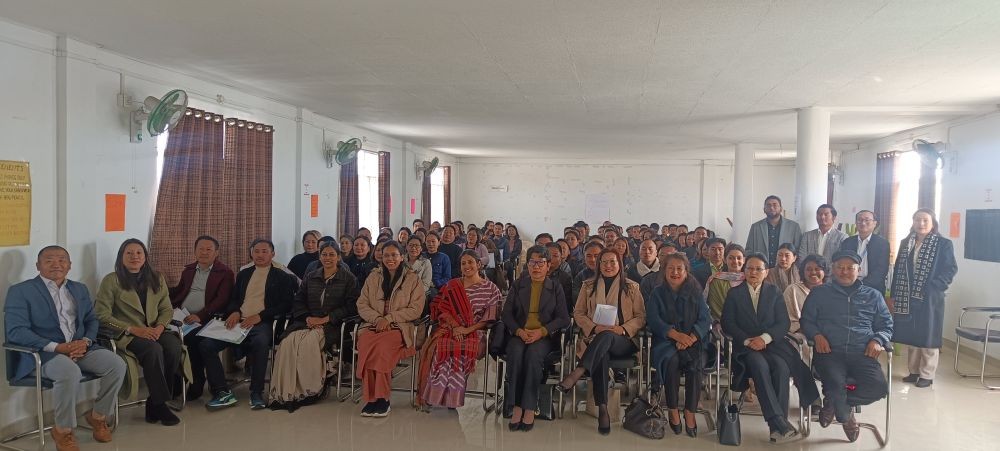Kevileno Angami, Commissioner & Secretary, School Education & SCERT (5th from Right) seen with Swati Mohan, Joint Executive Director of Antarang Foundation (6th from Right), Kelhikha Kenye, Deputy Mission Director, Samagra Shiksha (L), trainers, other officials and trainees during the inaugural of the three-day training for Block Level Resource Persons in Career Counselling at SCERT. (Morung Photo)

Three-day training for block-level resource persons in career counselling underway
Morung Express News
Kohima | February 4
Emphasizing the need for informed career decisions, Swati Mohan, Joint Executive Director of Antarang, highlighted that young people deserve to have career dreams, work towards achieving them, earn high wages, and improve their lives and the lives of their families.
In her brief address during the inauguration of the three-day training for Block Level Resource Persons in Career Counselling at SCERT, she stated, “This is about collectively unlocking a future for over 6 lakh youth in Nagaland—a future that goes beyond government jobs, towards green careers, entrepreneurship, and a domino effect that benefits future generations of Nagaland.”
The Phase-2 Training, organized by Samagra Shiksha Nagaland in collaboration with the Antarang Foundation from Mumbai, has been a partner in over 2,000 schools and colleges across the country. The foundation has been working with Nagaland since last year, impacting around 200 schools.
Addressing the gathering as the special guest, Kevileno Angami, Commissioner & Secretary of School Education & SCERT, asked, “When we talk about counselling in schools, the first question is, why counselling? Which leads us to ask why do we send our children to school, or why do we have schools?”
She explained that the answer to these questions is that schools exist to teach children to read and write, gain knowledge, learn life and social skills, and ultimately find a career path that provides a livelihood. She also noted that many people have chosen their career paths without guidance, highlighting how peer pressure or parental influence often plays a role in deciding careers, like opting for civil service exams without fully understanding one's strengths or interests.
“We are still in an age where our children are choosing careers because they are influenced by others or pressured by their peers,” she said. Many students end up on the wrong career path, influenced by external pressures, without understanding their own abilities and aptitudes, she added.
‘Our responsibility to provide guidance to children’
Reflecting on the National Education Policy (NEP) 2020, which emphasizes flexible curricula and integrates arts, physical education, and sports, Angami stated, “We need to offer a multi-disciplinary approach in our schools and colleges, giving children the flexibility and options to choose their path.”
She mentioned that the Government of India has mandated the inclusion of vocational education in schools. Through Samagra Shiksha, vocational education is currently offered in over 153 government schools, with plans for expansion. However, she stressed that there is a need to increase the number of disciplines available to students to help them make informed choices.
“At this stage, it is crucial that we begin with career counselling,” she asserted. The counselling program will provide necessary information to students, helping them make firm decisions about what is best for them. She emphasized that career counsellor teachers will assess students’ strengths and weaknesses, helping them navigate the job market’s demands.
“While the ultimate decision lies with the students, it is our responsibility to guide them,” she said.
In his welcome address, Kelhikha Kenye, Deputy Mission Director of Samagra Shiksha, who chaired the program, emphasized the significance of the training in light of the state’s alarming unemployment rate. He expressed hope that students would begin making informed career choices from an early age, based on their potential.




